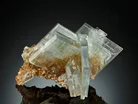Focus on: Barite - a Crucial Critical Mineral Resource

What Is Barite?
Barite, a mineral composed of barium sulphate, plays a crucial role in various industries. Its name derives from the Greek word 'barys', meaning heavy, which describes its high specific gravity. Barite's unique properties make it indispensable in many applications, from oil drilling to medical imaging.
Barite mining methods vary depending on the deposit type. Open-pit mining is common for near-surface deposits, while underground methods are employed for deeper veins. The extraction process typically involves drilling, blasting, and hauling the ore to processing facilities.
John Smith, Chief Mining Engineer at Global Barite Corp, describes the process: "Once extracted, we crush and grind the ore, then use gravity separation techniques to concentrate the barite. The final product is often further processed to meet specific industry standards".
What Are Barite’s Unique Properties?
Barite's most notable characteristic is its high density, typically ranging from 4.3 to 4.6 g/cm³. This property, combined with its chemical inertness and low solubility, makes it ideal for use in drilling fluids. Barite's ability to withstand high pressures and temperatures is what makes it so valuable in the oil and gas industry.
Top Barite-producing countries
China has long been the world's leading barite producer, followed by India and Morocco. However, recent years have seen shifts in the global production landscape. The US Geological Survey reports that China's share of global barite production has decreased from about 44% in 2012 to 36% in 2022, while countries like Morocco and Kazakhstan have increased their output".
Industrial applications of Barite
Barite's primary use is in the oil and gas industry as a weighting agent in drilling fluids. This application accounts for approximately 80% of global barite consumption. However, its uses extend far beyond drilling.
Professor Amanda Lee, Chemical Engineering expert at MIT, elaborates: "Barite is crucial in industries ranging from automotive to medicine. It's used in brake linings, as a filler in paints and plastics, and even in medical imaging as a contrast medium for X-ray examinations".
The Barite supply chain
The barite supply chain is complex, involving miners, processors, distributors and end-users across various industries. The journey from mine to market often spans continents, with significant maritime transport involved.
David Brown, Logistics Manager at International Barite Traders, provides insight: "We're seeing increased vertical integration in the industry. Major oil services companies are securing their own barite sources to ensure stable supply. This shift is reshaping traditional supply chains".
Geopolitical complexities and evolving dynamics
The concentration of barite production in a handful of countries introduces geopolitical considerations. Trade tensions, environmental regulations, and resource nationalism can all impact the global barite market.
Recent years have seen efforts to diversify supply sources. The US, for instance, has been working to revive domestic production to reduce reliance on imports.
Dr Elizabeth Taylor, Resource Economist at the London School of Economics, says: "We're witnessing a recalibration of the barite market. Countries are increasingly viewing it as a strategic resource, given its importance in energy production".
Environmental concerns are also shaping the industry. There's growing pressure for sustainable mining practices and the development of barite substitutes. "The industry is at a crossroads", says Dr Taylor. "Balancing supply security, environmental responsibility, and economic viability will be crucial for its future".
As the global energy landscape evolves, so too does the barite industry. With emerging technologies and shifting geopolitical realities, the sector faces both challenges and opportunities.
As John Smith of Global Barite Corp concludes, "The barite industry has always been dynamic, but the pace of change we're seeing now is unprecedented. It's an exciting time to be in this business".

